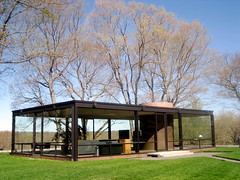 The article about how the New York Times is striving to maintain an editorial policy of "civil discourse" in the comments on its blogs raises some interesting issues (Matthew Hennessey touched on a few here). It led me to think that in some ways blogs blur the lines between public and private space. For example, if you have an open house party and a guest leaves footprints on your walls you're well within your rights to give him the boot. But discouraging similar unruliness by deleting or editing comments on a blog can quickly lead to accusations of censorship.
The article about how the New York Times is striving to maintain an editorial policy of "civil discourse" in the comments on its blogs raises some interesting issues (Matthew Hennessey touched on a few here). It led me to think that in some ways blogs blur the lines between public and private space. For example, if you have an open house party and a guest leaves footprints on your walls you're well within your rights to give him the boot. But discouraging similar unruliness by deleting or editing comments on a blog can quickly lead to accusations of censorship.
This issue is compounded by the fact that blogs are hosted and owned in a number of different ways, from free public services like Blogger to proprietary and commercial institutions of journalism like the NYT. That's why bloggers and hosts develop content policies and terms of service to set the rules of use, indemnify themselves, reserve rights, etc. Otherwise all the huffing and puffing might blow their blog down.
It seems natural then, given the public/private nature of blogs, that many would adopt a "house rules" approach to filtering content, and transparency comes from making that policy explicit. Do the blogs of journalists, press, and media carry unique or additional responsibilities for disclosure or tolerance? Many letters to the editor never see the light of day, but there's no public outcry over that.
Photo of Philip Johnson's Glass House by Mel K (CC).
Monday, November 12, 2007
I Built My Blog of Glass
Labels:
censorship,
journalism,
New York Times,
private,
public,
transparency
Subscribe to:
Post Comments (Atom)


4 comments:
A difficult question of ethics , my personal view is whoever does the work ( creating and maintaining a blog or other platform ) does have the right to enforce their own rules and standards
steve
Striving to maintain an editorial policy of "civil discourse" is laudable and in my opinion the way it should be. Short of profanities I think everyone has a right to his/her opinion.
"Many letters to the editor never see the light of day, but there's no public outcry over that." I couldn't have agreed more with that and as a matter of fact It was the Times of India editor's censorship( in the broader sense of filtering) that led me to create my first blog
As you point out (and so eloquently do above), transparency is the key. Blog owners (even media outlets) have the right to determine what content is inappropriate, and to remove or disallow it. This is made much simpler, clearer, and more palatable when the guidelines are plainly stated and the house rules known to all.
I'd like to do away with comments to blogs and letters to the editors all together. I think the ethical questions are too important, and that the news media should focus on it's job of reporting facts. This happened here. This person did that. I don't want to know what you thought about it, and no one wants to know what I thought about it.
But it seems that more and more private companies live and die by how much they can make off their content, and user written, controversial, engaging content sells more than just the facts.
Post a Comment